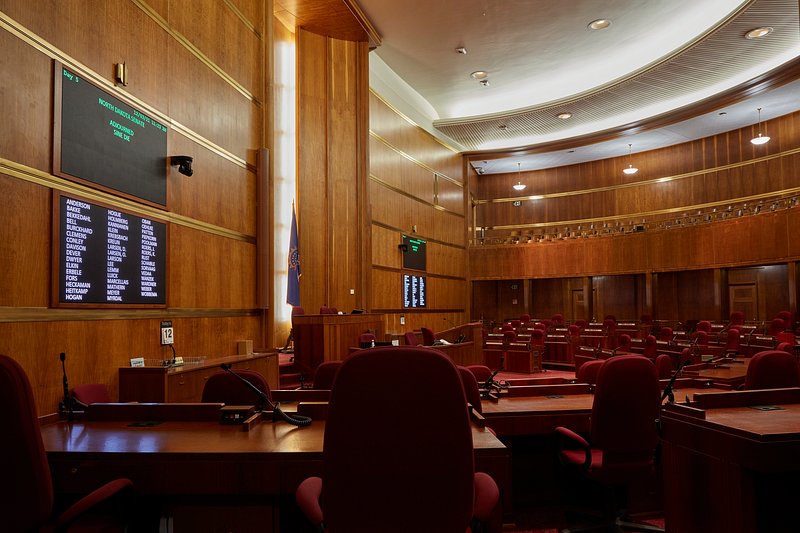South Dakota, renowned for its breathtaking landscapes and rich history, now finds itself navigating the complexities of property tax reform. Lawmakers, with a keen eye on both immediate relief and future sustainability, are working diligently to mitigate the surge in owner-occupied property taxes, ensuring that burdens are equitably distributed across the state.
The state capital in Pierre is abuzz with activity as leaders convene under the copper dome to address the pressing issue. Republican Governor Larry Rhoden has been a steadfast advocate for tax relief since he assumed office. His commitment to resolving these tax challenges reflects the values of the resilient and community-focused people of South Dakota.

Larry Rhoden
“There is a lot of concern about property taxes. That’s an issue I’ve worked on ever since I came to Pierre,” remarked Gov. Rhoden. “I will convene leadership in the House, the Senate, and other interested parties to sit down with me and find solutions.”
This working group, composed of House and Senate leaders along with other stakeholders, is tasked with creating a balanced plan to alleviate tax pressures without compromising the financial stability of fundamental services.
Identifying Immediate and Long-term Solutions
House Majority Leader Scott Odenbach, representing the bustling town of Spearfish, emphasized the urgent need for a dual approach: immediate action paired with long-term strategies connected to spending and the school funding formula.
Scott Odenbach
“Number one would be to stop the bleeding and see what we can come up with this year and give taxpayers some hope that this is a serious issue,” Odenbach stated. Addressing costs associated with education funding remains a pivotal element in the financial equation.
State legislators annually establish the mill levy, a crucial factor determining property tax rates. Consequently, any substantive change to tax structures must consider the levy’s impact on local governance and community services.
Focused Relief Where It’s Needed Most
Senate Majority Leader Jim Mehlhaff, representing Pierre, has advocated for targeted property tax relief. He believes that reforms should concentrate on regions experiencing the sharpest property value increases, such as Spearfish and Deadwood.
“That’s where the hurt is,” Mehlhaff noted. “Any solution we come up with needs to be more focused where the hurt is rather than a blanket approach.”
In recognition of these regional disparities, approximately a dozen legislative bills have been introduced, each proposing specific adjustments to the tax codes affecting owner-occupied properties. Lawmakers are acutely aware that property taxes have surged dramatically since 2021 due to heightened housing market activities, influenced partly by South Dakota’s burgeoning economy and appeal as a residential haven.
A Call for Comprehensive Analysis and Study
There is momentum behind an initiative to conduct an interim study examining the property tax infrastructure. Democratic Senator Jamie Smith has long championed a comprehensive review of South Dakota’s tax system to enhance its fairness and efficiency.
“Rather than just say, I think this is going to work, let’s fix this one little thing… or this helps this person — it’s a shell game, and we know that,” Smith emphasized. Rolling it around without a uniform approach merely shifts the burden invisibly to other taxpayers.
Senator Randy Deibert, representing Lawrence County, home to historic Deadwood, echoes this sentiment. As a member of the governor’s working group, he advocates for a ‘bridge’ approach — delivering immediate relief while working towards a comprehensive and sustainable framework.
The Threat of a 2026 Ballot Measure
The urgency of these legislative efforts is further underscored by the looming threat of a statewide ballot measure in 2026. This measure could mandate rolling back property taxes to November 2020 values, restricting future increases to a maximum of 2.25% per year. Such a cap could significantly impact public revenue streams vital for maintaining the infrastructure and services valued by communities across the state.
Aberdeen’s Senator Carl Perry, renowned for his pragmatic outlook, acknowledges the necessity of a strategic tax shift. “We’re not at the point where I would say we’re singing ‘kumbaya,’ but we’re moving in the right direction,” explained Perry. “The public and constituents will be happy with the results of the leadership team.”
As South Dakota’s legislators labor toward an equitable resolution, they remain fueled by the spirit and resilience inherent to their constituents. The hard work ahead reflects their commitment to upholding the welfare of every community across the diverse and scenic plains of South Dakota.
